初中英语语法学习之介词与介词短语讲义
初中英语语法之介词讲解
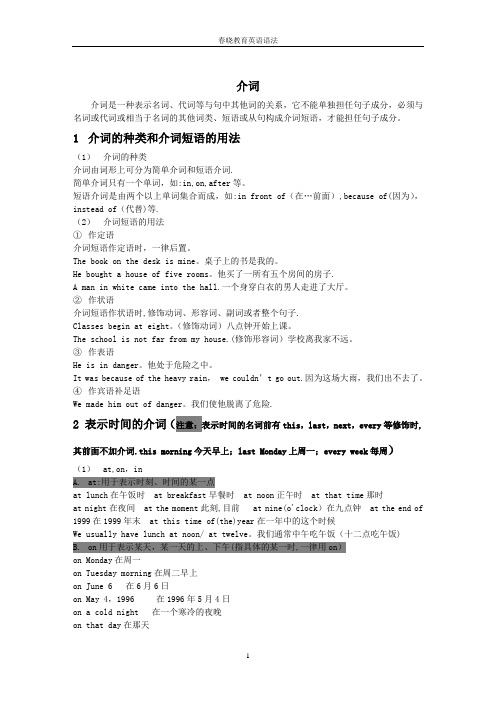
介词介词是一种表示名词、代词等与句中其他词的关系,它不能单独担任句子成分,必须与名词或代词或相当于名词的其他词类、短语或从句构成介词短语,才能担任句子成分。
1介词的种类和介词短语的用法(1)介词的种类介词由词形上可分为简单介词和短语介词.简单介词只有一个单词,如:in,on,after等。
短语介词是由两个以上单词集合而成,如:in front of(在…前面),because of(因为),instead of(代替)等.(2)介词短语的用法①作定语介词短语作定语时,一律后置。
The book on the desk is mine。
桌子上的书是我的。
He bought a house of five rooms。
他买了一所有五个房间的房子.A man in white came into the hall.一个身穿白衣的男人走进了大厅。
②作状语介词短语作状语时,修饰动词、形容词、副词或者整个句子.Classes begin at eight。
(修饰动词)八点钟开始上课。
The school is not far from my house.(修饰形容词)学校离我家不远。
③作表语He is in danger。
他处于危险之中。
It was because of the heavy rain, we couldn’t go out.因为这场大雨,我们出不去了。
④作宾语补足语We made him out of danger。
我们使他脱离了危险.2 表示时间的介词(注意:表示时间的名词前有this,last,next,every等修饰时,其前面不加介词.this morning今天早上;last Monday上周一;every week每周)(1)at,on,inA.at:用于表示时刻、时间的某一点at lunch在午饭时 at breakfast早餐时 at noon正午时 at that time那时at night在夜间 at the moment此刻,目前 at nine(o'clock)在九点钟 at the end of 1999在1999年末 at this time of(the)year在一年中的这个时候We usually have lunch at noon/ at twelve。
英语语法介词和介词短语课件PPT

A.by
B.in
C.at
D.on
A.in; at
B.at; in
C.in; in
D.at; on
3.She went ____A____ the street to make some purchases. A.across B.through C.over D.above
4.—How do you study English?
—I study English ___A_____ talking with my foreign friends.
语法互动(五)┃介词和介词短语
4.since/for (1)“since+(具体时刻/that从句)”表示“自从……起一直到现在”。 Uncle Li has worked in this factory __s_in__ce___ 2000. 李叔叔自从2000年起就在这家工厂工作了。 (2)“for+(一段时间)”表示“有……之久”。 Uncle Li has worked in this factory ___f_o_r___ over 10 years. 李叔叔在这家工厂已经工作十多年了。
语法互动(五)┃介词和介词短语
以……开始_b_e_g_i_n_/_st_a_r_t_w_i_t_h_ 擅长…… be good at
对……有害处 be bad for
充满 be full of
确信 be sure of/about
习惯于…… _b_e__u_s_e_d_t_o_
对某人要求严格 be strict with sb.
初中英语 语法
课件PPT
语法互动(五) 介词和介词短语
语法互动(五)┃介词和介词短语
中考要求 1.熟练掌握常用介词的基本用法(表示时间、地点、位置、
初中英语语法专题讲座12——介词

这三个介词都可以表示地点,意思是“在……上”,但具体含义有所不同。
⑴on是指与物体表面接触而不是在其上方。例如:They are sittingonthe grass.他们坐在草地上。Do you liveonthe second floor?[美国英语]你住在二楼吗?/[英国英语]你住在三楼吗?He jumpedonthe horse.他跳上了马。
⑵介词短语用作宾语补足语,例如:I was surprised to find himon the bus.发现他在公共汽车上,我很吃惊。Please make yourselfat home.请随便一点,不要拘束。
⑶介词短语用作后置定语,例如:The girlin the hatis my sister.那个头戴帽子的女孩是我的妹妹。Do you like the jacketon the left?你喜欢左边的那件短上衣吗?Did you see the housewith many trees around it?你看到那座周围长满树的房子了吗?
7.instead, instead of:
⑴instead不是介词,而是副词。它的意思是“作为代替;(不……)而”,中文译法灵活。instead常位于句末。例如:He was ill, so I wentinstead.他病了,因此我就(代他)去了。I don’t like this one; please give me thatinstead.我不喜欢这一个,请把那一个给我。They don’t have beef; let’s have some fishinstead.他们没有牛肉,我们改吃鱼吧。
2.during, in:
两者用作介词时均与表示一般时间的名词连用,意为“在…期间”,一般情况下能相互换用。但是,在实际运用中应注意下面几点:
初中英语语法专题复习之介词与介词短语

初中英语语法专题复习之介词与介词短语英语介词与介词短语语法是英语学习中非常重要的一部分,它涉及到英语语法中的很多方面。
在学习英语介词与介词短语语法时,我们需要掌握基本的介词分类、介词的用法以及介词短语的构成和使用。
一、英语介词的分类英语介词可以分为简单介词和合成介词两类。
简单介词包括:in、on、with、by、for、at、about、under、of等。
合成介词是由两个或多个单词组成的介词,例如:into、within、throughout、inside、outside、without等。
简单介词和合成介词在使用时有不同的用法和含义,需要根据具体语境来确定其使用。
英语中的介词可以分为时间介词、地点介词、方向介词、方式介词、原因介词、结果介词等多种类型。
这些介词在使用时需要特别留意,因为它们的用法和意义各不相同。
例如,“at”表示时间,而“in”表示地点;“on”表示时间或日期,而“to”表示方向或目的等。
在学习英语介词时,我们需要熟练掌握这些基本的规则,以便能够正确地使用介词。
二、英语介词的用法英语介词在使用时有以下用法:表示位置或方向:in、on、at、under、over、beneath等。
表示时间:for、during、after、before、afterwards、subsequently 等。
表示方式或手段:by、through、via、with、in、on等。
表示原因或目的:because、for、in order to、to、in that等。
表示比较或对比:as、like、unlike、compared to等。
表示限制或范围:within、within limits、beyond、outside等。
表示数量或程度:twice、three times、once、twice as much等。
表示空间关系:next to、beneath、above、on the other hand等。
介词、介词短语和短语动词讲解

介词、介词短语和短语动词一、考纲内容熟悉介词的基本意义及用法;辨析相近、易混介词的用法;掌握常用介词短语的意义及用法;掌握常用短语动词的形式、意义及用法。
二、命题趋势1.语法填空主要考察介词的基本意义和用法,用时兼顾对介词短语的考察。
2.短文改错主要考察介词的误用。
3.考察介词与名词、形容词或动词搭配的意义和用法。
三、介词(一)介词的分类1.从结构上看,介词可以分为以下几类:简单介词(由一个词构成的介词)、合成介词(两个词合在一起的介词)、短语介词(一个或几个简单介词或其他介词组合在一起的介词)、分词介词(部分动词的-ing形式和过去分词形式)。
2,从意思上考虑,介词可以分为下面三类:弓[导时间短语的介词、弓[导地点状语的介词、弓I导其他短语的介词。
(二)介词(短语)的用法区别1.表示方位的at,in,on,to,beside/by 和near⑴at 一般指在较小的地方例:1 met him at the shop.⑵in 一般指在较大的地方,或在某一范围内例:a. They arrived in Beijing yesterday.b. Shandong Province lies in the east of China.⑶on 一般指在物体的表面,或相邻并接壤的两个地域例:a. The picture is hanging on the wall.b. Mongolia is on the north of China.(4)to表示某范围外接壤或不接壤的两个位置例:Shandong Province is to the southeast of Hebei Province.(5)beside/by译为“在…旁边”例:a. She was standing beside her mother.b. There is a small house by the river.(6)near译为“接近;靠近”例:There is a supermarket near my home.2.表示方位的between和among⑴between在两者或每两者之间例:I stand between Sue and Jane.⑵among在三者或三者以上之间例:The teacher was standing among the students.3.表示方位的across,through,over 和past(1)across从…的表面穿过例:He walked across the square to meet us.⑵through从…的内部穿过例:The guide led us through the forest.⑶over从…的上面跨过例:The thief jumped over the fence and fled away.(4)past在…的旁边经过例:She walked past the shop.4.表示时间的介词⑴表示“在…”的:at,in,ona.at表示在某个时间点、时刻或重大节日例:at 9:00; at noon; at Christmasb.in表示在某段较长的时间内,世纪、朝代或年月;泛指的上午、下午、傍晚等。
初中英语语法专题介词与常见短语

初中英语语法专题介词与常见短语介词(preposition 简写prep.),又称作前置词,表示名词、代词等与句中其它词的关系,在句中不能单独作句子成分。
小编在这里整理了相关资料,快来学习学习吧!初中英语语法专题介词一、概念介词(preposition)表示与名词、代词等其它词的关系,不能单独做句子成分,介词后面的成分称为宾语。
二、分类介词可以用来表示时间、地点、方位、方式、手段等。
①重点词整理解析(at\in\on\by\before\after\until\for\since)at1. at+点钟at one o’clock 在七点钟2. at+the+n’ s (shop) at the baker’s (shop) 在面包店 at the hairdresser’s (shop)在理发店3. at noon/night/midnight 在正午/夜晚/午夜4. at home/work/school/church 在家/上班/上学/做礼拜5. at breakfast/lunch/dinner 在吃早/午/晚饭6. arrive at+小地点 arrive at the airport 到机场7. at+节日 at Spring Festival 在春节期间8. call sb at+号码打...号码找某人9. email sb at+邮件地址发...电子邮件给某人10. call at +地点拜访某个地方11. 其它固定搭配 at the price/speed...of 以...的价格、速度in1. in+年、月 in 2019/May 在2019年五月2. in+季节 in Summer 在夏天3. in the morning/afternoon/evening 在早上/下午/晚上4. in+世纪 in the twenty-first century 在21世纪5. in+颜色表示穿着 the girl in red 穿红色衣服的女孩6. in+语言 in English/Chinese 用英语/汉语7. in+声音 in a weak voice 用微弱的声音8. in+时间段表示将来 in five minutes 五分钟以后 (划线提问用‘how soon’)9. in+地点(大地点) in Qingdao 在青岛10. in+物体在...里面 in the glass 在杯子里11. in+方向 in the west 在西边12. 其它 in front of 在...前面 in the end 最后 in the past few years 在过去的几年里on1. on+具体日期/礼拜 on May 8th 在五月八日 on Wednesday 在周三2. on+ 节日(带Day 的节日) on Mother’s Day 母亲节3. on+地点 on the table(在桌子上) on the train(在火车上)4. call on+sb call on your friend 拜访你的朋友5. 表示方位(毗邻、接壤) Russia is on the north of China. 俄罗斯与中国北部相连。
介词与介词短语英语知识点总结

介词与介词短语英语知识点总结介词是一种用来表示名词与其他词或短语之间关系的词类。
常见的介词有in, on, at, for, with等。
1. 位置关系:- 在某位置:in, on, atin表示在物体或空间内部,on表示在物体表面,at表示在具体位置或某地。
例句:He is in the room. She is sitting on the chair. They are waiting at the bus stop.- 离开某位置:from, off, out offrom表示离开某一具体位置,off表示从某一表面离开,out of表示从某一空间或物体内部离开。
例句:He is coming from the airport. The cat jumped off the table. She took her phone out of her bag.2. 时间关系:- 表示具体时间:in, on, atin表示在某一段时间内,on表示在某一具体日期或星期,at 表示在某一具体时间。
例句:We will have a meeting in the afternoon. I will see him on Monday. The movie starts at 7 o'clock.- 表示时间段:during, forduring表示在某一整个时间段内,for表示在某一时间段的持续时间。
例句:He slept during the night. I will stay here for a week.3. 关系连接:- 表示原因:because of, due tobecause of表示由于,due to表示由于(正式用语)。
例句:He couldn't come because of the rain. The event was canceled due to bad weather.- 表示目的:for, tofor表示为了某一目的,to表示向某一目的地或对象。
初中英语语法学习之第十三讲介词与介词短语
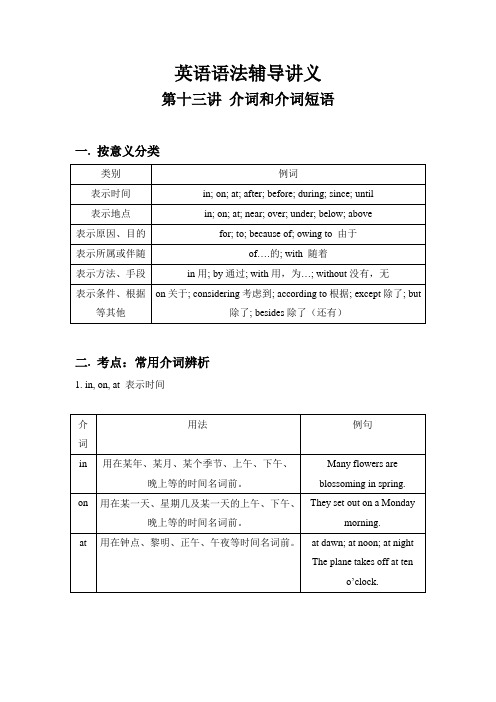
of….的; with随着
表示方法、手段
in用; by通过; with用,为…; without没有,无
表示条件、根据等其他
on关于; considering考虑到; according to根据; except除了; but除了; besides除了(还有)
二.考点:常用介词辨析
1.in, on, at表示时间
above/below
表示一般地“高于”或“低于”,不一定是垂直地“在上”或“在下”。
I live below the mountain.
注意:有时题目中会将on, over,与above进行辨析,注意“on”是有接触面得放于…上面。例如:There is a bag on the table.“over”与“above”是没有接触面的。
英语语法辅导讲义
第十三讲介词和介词短语
一.按意义分类
类别
例词
表示时间
in; on; at;after;before;during;since;until
表示地点
in; on; at;near;over;under;below;above
表示原因、目的
for; to; because of; owing to由于
表示与某地相邻的关系。
Hunanis on the east ofGuizhou.
5. across, through, over表示“通过”
介词
用法
例句
across
across的含义与on有关,表示动作是在某一物体的表面进行的。
It took them six weeks to walk across the great desert.
介词讲义完整版

介词一;介词的分类1.简单介词;是指单个的介词如: in; on; at; on; to; with等2.合成介词;是指两个简单介词合在一起构成的介词如: into; onto; without; inside3.短语介词;是指一个或两个简单介词与一个或几个其他词类的词组合;在意义和作用上相当于一个简单介词的短语如: instead of 代替 because of因为according to按照 in front of 在...的前面二;表示时间的介词1.at表示具体的时间点如:at eight o’clock联想: at构成的固定短语:at first首先 at least至少at present目前 at noon在中午at the age of在...岁时 at the moment在目前;现在at the same time同时 at school 在上学at the end of在......末如: In some western countries shops are closed___________ weekends.2.in用于年;月;季节;上午;下午;晚上等..in March在三月 in spring在春天in 2008在2008年 in the morning/afternoon/evening注意: in表示在某一季节或某一月份时;一般不加冠词;但季节和月份的意义一旦具体化;就要加定冠词the..如: The weather is a little in May.An earthquake happened in Sichuan in the May of 2008.In summer children are happy because they can swim.联想:in构成的固定短语:hand in上交 in fact事实上in surprise吃惊地 in search of寻找in public当众 in the end最后;终于in no time立刻;马上 in a minute立刻;马上in front of在...前面 in a word一句话;总而言之in good health身体健康的 do well in在...方面干的不错be interested in对...感兴趣 in common共同的show great interest in对......感兴趣in the last/past several years在过去的几年里3.表示具体的某一天或某一天的早晨;晚上等;用on..如: In the morning I often get up at six o’clock but________Sunday morning; I get up at seven.A traffic accident happened near our school _________ the night of May 2nd; 2014.联想:on构成的固定短语:on board乘坐车;飞机 on duty值班;值日on earth到底 on fire着火on foot 步行 on hire雇佣on holiday度假 on time按时be on show展览 on the right在右边on the other hand另一方面 a book on history一本关于历史的书on one’s way to在某人去...的路上4.表示时间的since; for; by; during; until1since自从后跟具体的过去时间;for后接一段时间..for和since短语所在的句子应用现在完成时;谓语动词要用延续性动词..如:Great changes have taken place in my hometown since the year 2000.We have lived in the city for about five years.(2)by+时间点;意为“到...为止”;如果by后面跟的是将来的时间点;用一般将来时或将来完成时;如果by后面跟一个过去的时间点;用过去完成时..如: I will finish eating by nine o’clock.By the end of last week; we had finished learning Unit5.(3)during+时间段;与延续性动词连用;表示某期间的动作..如:She had trained hard during the four years to get ready for London Olympic Games.(4)until+时间点;意为“道...为止”;句中的谓语动词若是非延续性动词;构成句型not...until直到...才如: We stayed there until the sunset.We didn’t go home until the sunset.(5)表示时间前后的before; afterbefore在...之前; after在...之后如:We must hand in our homework before class.After half past eleven we can relax ourselves.注意:before作为介词;还可以表示“面临;面对”如:What should you do before so many difficultiesI had nothing to say before her.三.表示方位;地点;行为对象等的介词1.表示方位的介词in; to; onin表示包含关系;意为“在......范围内”;on表示相邻关系;接壤;to表示相隔关系..如:China is________ the east of Asia.Japan is ________ the east of China.Russia is ________ the north of China.2.表示“上下”等方位的介词over; under; above; below; on(1)over在......正上方;其反义词为under如:There is a football under the desk.I looked up and saw a plane flying over my head.(2)above表示“在......上方”;非垂直关系; 其反义词为below如:The plane is flying above the clouds.(3)on在......之上;指两者表面接触..其反义词也为under3.表示“前后”的介词和短语介词(1)in front of 在......前面;指在范围之外的前面;和before意义接近..如:There are some bikes in front of the teaching building.(2)behind是in front of 的反义词;意为“在......后面”(3)in the front of表示在范围之内的前面;其反义词组是at the back of4.by; beside在......旁边;between在两者之间; among在三者及以上之间(1)by和beside意义相近如:Do you know the man who is standing by the windowLucy sits beside me. She is my deskmate.(2)between指两者之间;也表示三者或多者中的每两者之间;among指三个或三个以上的事物或人之间..注意:between表示两者之间;只要构成双方关系;就可以用between如:There are so many desks in the classroom that there is hardly any room to move between them. 教室里有这么多张课桌;几乎没有空间从它们中间穿过..5.across; through穿过across从表面穿过;through穿越;穿透;透过;指从物体内部穿过..如:1When you go________ the road; you must be careful.2Which river runs________ Shanghai3 --I left my keys in the room yesterday. I had to get in________ the window.--It’s dangerous to do that.A. inB. throughC. overD. to6.表示里外的in; inside; into; onto; out of; outside(1)in在......之内如:My keys are in my pocket.注意:外来物“在树上”;用in;树上结出的东西“在树上”;用on如:There are some birds________ the tree.Autumn comes and some red apples________ the apple trees come into people’s eyes.(2)inside在......里面;到......里面..反义词为outside如:ListenSomeone is talking in a low voice inside the door.Don’t stay outside.(3)into到......内..强调空间或状态的转换..反义词为out of如: Why not go into the house and have a lookHe looked out of the window and saw some people coming back from work.注意: out of 还有“脱离;失去”等意义..如: He has been out of work for long.Fish can’t live long out of water.7.表示“靠近”的near; next to; aroundnear在......附近next to在......旁边around在......周围如: There is a park near our neighborhood.I didn’t remember to phone until near the end of the week.The mouse is next to my computer.That patient is next to death.The flowers and applause掌声 are always around the winners.注意:around 还表示“大约”;同义词:about如:It was around/about twelve o’clock in the evening.8.表示运动方向的for; to; towards(1)for常接在leave; start等动词之后;表示运动的方向或目的地..如: They’ll leave for Beijing to attend the meeting next month. (2)to跟在go; come; return; move等动词之后;表示目的地;它既表示运动方向;又包含运动结果..如:When did you return to Guangzhou after the summer holiday(3)towards朝;向..只说明运动的方向;没有“到达”的意思如: The teacher is coming towards the classroom now.9.表示行为对象的to; at一般来说;at 同某些动词连用;表示攻击目标;含有某种程度的恶意;to则只表示方向;并无恶意..如: I threw the ball to him and he threw it at the dog.He came________me and said hello to me.A dog came________her and she was frightened受惊吓的..10.最高级结构中表示范围的of; in同类比较时;若主语和范围一致;一般用of; of后多为数词或可数名词复数;将某人/某物置于集体或环境中进行比较时;用in; in后一般是可数名词的单数..如:She is the most beautiful girl ________ the three sisters.Tom is the tallest boy________ the class.四.表示“除......之外”的介词1.besides除......之外还如: Five others were late besides me.There will be five of us for dinner; besides John.2.but; except除......之外..but常与否定词连用如: No one but we knows about the news.He has few friends except you in this school.He has few friends except you in this school.They all went to sleep except me.3.except for表示从整体中排除;除......之外;前后不是一类事物..如: The care is really wonderful except for its price.The composition is quite good except for a few spelling mistakes.五.表示方式;手段或工具的介词1.by; in; on表交通方式by bike=on a bike; by car=in a car如:Do you usually come to school by bike2.by; in with表示手段或工具(1)by表示用某种方式或手段..名此前不加冠词..如: This pair of shoes is made by hand.The old man had to make money by selling vegetables.(2)in表示使用某种语言;用墨水;颜色;颜料等..名此前不加冠词..如: Can you say it in EnglishPlease write it in ink; not in pencil.(3)with后跟具体的工具如: People here build houses with stones.I like to write with a ball pen.拓展:with常用来表示伴随;意为“有;带有”;其反义词为without如:This is a house with a garden.Fish can’t live without water.六.引出动词不定式逻辑主语的介词..1.一般情况下用for sb. to do sth如:It’s necessary for us to learn English.It’s difficult for children to read such a book.2.表示品质;性格;特征的形容词后用of sb. to do sth.; 这类句型中动词不定式的逻辑主语和形容词构成主系表结构..如:It’s foolish of him to make such a decision.It’s kind of you to give me so much help.七.其它介词的用法1.as作为;as for至于如: ________students we should work hard.He works________ a teacher in this school.________him; I know nothing.2.thanks to 同because of;意为“因为;由于”如:Thanks to your help; I am good at my lessons.Because of the weather; we have to put off the sports meet.八.介词的省略1.in的省略be busy in doing sth忙于做某事have difficulty/trouble in doing sth.做某事有困难in this/that way以这种/那种方法spend...in doing sth. 花费......做某事have a good time in doing sth. 做某事很高兴waste... in doing浪费......做某事There’s no use/good in doing sth.做某事有用/没有好处2.for的省略for+时间段里的for;在口语中可以省略;尤其是在肯定句中..但是在否定句中或在句首一般不可以省略..如:The rain lasted for a whole afternoon.He has been waiting for three hours.We haven’t seen each other for a long time.For a whole month; there is no rain.九.常用介词短语1.常与with连用的短语do with处置;对付go on with继续......agree with同意......be busy with忙于keep/catch up with跟上fill...with....用......装满......be familiar with...熟悉......be popular with...受......欢迎be angry with sb.生某人的气cover...with....用......覆盖........ help...with...在......方面帮助...... get on well with与......相处的好be strict with sb.对某人要求严格be pleased with sb.对某人感到满意2.常与at 连用的短语look at看knock at敲at last最后at once立刻laugh at嘲笑......shoot at朝......射击work at致力于......be good at擅长......be weak at不擅长......arrive at到达某地小地方be amazed at对......感到吃惊3.常与on连用的短语get on上车turn on打开try on试穿put on穿上call on 号召depend on依靠;取决于live on 依赖........生活spend...on...在......上花费......4.常与of连用的短语hear of听说take care of照料look out of朝外看a kind of一种a type of一种be fond of喜欢instead of代替......think of认为;考虑all kinds of各种各样的be proud of为......而骄傲be confident of对......有信心be tired of对......感到厌烦be made of由......制成能看出材料be scared/afraid/terrified of...害怕......5.常与from连用的短语come from来自于be far from距离......远hear from收到......的来信across from在......的对面be different from与......不同borrow... from...从......借来......be made from由......制成看不出原料6.常与for连用的短语look for寻找for example例如be late for迟到be fit for适合wait for等候pay for为......付款for a while一会儿as for至于;关于be sorry for为......感到抱歉send for派人去请......leave for离开去......ask for请求;向......要...... thanks for为......感谢......get ready for为......做好准备be famous/known for以......而闻名7.常与to连用的短语get to到达turn to翻到pay attention to注意listen to听according to根据......be next to在......隔壁be friendly to对......友好to one’s joy使某人高兴的是be polite to sb. 对某人有礼貌to one’s surprise使某人惊讶的是。
介词和介词短语课件

• 介词的定义和功能 • 介词的分类 • 介词短语的构成和功能 • 介词短语在句子中的作用 • 介词和介词短语的常见用法 • 介词和介词短语的注意事项
01
介词的定义和功能
介词的定义
01
介词是用来表示名词或代词与句 子其他部分之间关系的词。
02
介词通常表示方向、位置、时间 或方式等关系。
作所涉及的对象。
描述时间
介词短语可以用来描述 时间,包括时间的具体
点、时间段等。
描述地点
介词短语可以用来描述 地点,包括地点的具体
位置、方向等。
描述方式
介词短语可以用来描述 动作或状态的方式,包 括使用的工具、方法等
。
04
介词短语在句子中的作用
表示时间
总结词
用于描述动作或事件发生的时间点或时间段
方式介词
01
02
03
04
总结词
表示动作方式的介词
详细描述
方式介词用于描述动作的方式 或状态,如“by”、
“with”、“in”、“on” 等。
例子
I usually go to work by bus.(我通常乘公交车上班。
)
例子
She is writing with a pen.( 她正在用笔写字。)
In表示在一个时间段或在一个
时期内,如in the morning、
in the 1990s等。
04
During表示在某个时间段内, 如during the holidays等。
05
Before和after表示在某个时间
点之前或之后,如before dinner、after school等。
初中英语语法基础——介词专题讲解 (附同步练习试题)
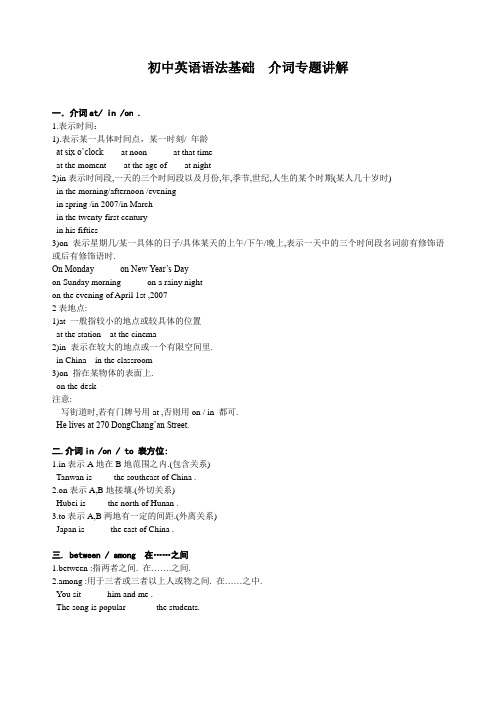
初中英语语法基础介词专题讲解一.介词at/ in /on .1.表示时间:1).表示某一具体时间点,某一时刻/ 年龄at six o’clock at noon at that timeat the moment at the age of at night2)in表示时间段,一天的三个时间段以及月份,年,季节,世纪,人生的某个时期(某人几十岁时)in the morning/afternoon /eveningin spring /in 2007/in Marchin the twenty-first centuryin his fifties3)on表示星期几/某一具体的日子/具体某天的上午/下午/晚上,表示一天中的三个时间段名词前有修饰语或后有修饰语时.On Monday on New Year’s Dayon Sunday morning on a rainy nighton the evening of April 1st ,20072表地点:1)at 一般指较小的地点或较具体的位置at the station at the cinema2)in 表示在较大的地点或一个有限空间里.in China in the classroom3)on 指在某物体的表面上.on the desk注意:写街道时,若有门牌号用at ,否则用on / in 都可.He lives at 270 DongChang’an Street.二.介词in /on / to 表方位:1.in表示A地在B地范围之内.(包含关系)Tanwan is ____ the southeast of China .2.on表示A,B地接壤.(外切关系)Hubei is ____ the north of Hunan .3.to表示A,B两地有一定的间距.(外离关系)Japan is _____ the east of China .三. between / among 在……之间1.between :指两者之间. 在…….之间.2.among :用于三者或三者以上人或物之间. 在……之中.You sit _____ him and me .The song is popular ______ the students.四.after / in 在……之后 before / in 在……之前1. after1)after + 时间段. 表示以过去某一时刻为起点的一段时间之后, 用于过去时.2)after 作介词. after doing sth.2.in +一段时间. 表示说话时或以现在为起点的将来一段时间之后.用于将来时.He came back ______ two days .He will go home___finishing his homework .He will come back _____ two days .3. before 多用于时间点或一件事之前发生,即“先于……;在……之前”He left the office bofore I got there. I’ll be back before five o’clock.4. ago 时间段+ ago 表示“多久之前”时态通常用:一般过去时I met Tom two days ago.五.with / in / by 表示“用……”1.with 表示“用…” 一般指有形的工具/ 手段/ 人体器官.He cut the apple into halves ____ a knife .注: with 表伴随, “带有,含有”He came in _____ a big smile on his face .2.in表示用某种语言,方式,途径. 或书写/绘画所用的材料. 也可表交通方式.Can you say it _____English ?He wrote a letter ____ blue ink .3.by表示乘坐交通工具, 表示方式,方法I study for a test _____ working with a group .He makes a living ____ selling newspapers .注意: 同义词组1).by phone = on the phone2).by car = in a car3).in pen = with a pen = with pens六.across / through / over / by 经过1.across 指横穿,穿过. 表示动作从某一物体表面上经过.2.through 指穿过,透过,表示从某一物体空间内通过.3.over 表示从某人或某物的上空经过或越过,不与表面接触.4.by 表示从某人/某物的旁边经过.Can you swim ______ the river ?the elephant is so big that it can’t go _____ the gate .I don’t think anyone can jump ___ the fenc e.I walked _____ the bank of China yesterday .七.in front of / in the front of1.in the front of 表示在…….内部的前面2.in front of 表示在……外面的前面There is a desk in _____ front of our classroom .There is a big tree in _____ front of our classroom.八.其它介词的用法:1.at的其它用法.1).表示“从事或正在做某事”,其后加的名词往往不加冠词.She is at work now = She is working now .2)at表示“价格或速度”The train ran at 120 kilometers an hour .2.in的其它用法:1)in表示“在……方面”词组:do well in = be good atbe weak in2)in 表示“穿着”后接表颜色的词或衣服.词组: be in +衣服= be wearing +衣服3)in作副词, “在家” = at home3.like 的用法:1).像/和……一样. 常与系动词连用.词组: look like sound like2).与what 连用, “是什么样子, 怎样”.What is he like ? He is kind .4.off的用法:1).从……下来, 脱离某物体.词组: fall off2). “休假”通常放在时间名词之后.词组: have +时间+ offHe has n’t had a night off for two hours .5.except / besides1).except 除了…….之外, 都……. . 不包括在范围之内.注: nothing but … 除了……之外,什么也没有.2).besides除了……之外,还有…… . 包括在范围之内.We all went swimming ______ Lucy .There is _______ a letter in the box .We study Japanese and French____ English .6.with / without1).with具有,含有反义词: without 没有词组: with the help of = with one’s help =because of = thanks towithout one’s help2).without 的用法:A).without + sb./ sth. 没有某人或某物B).without + doing sth . He lef t here without____(say ) “Goodbye”to usC). without sth 常与if 引导的否定的条件句.If there is no water , we can’t live .= We can’t live ______ _______ .7.on the tree /in the treeon the tree 表示“树上本身长的东西” 在树上.in the tree 表示“外界的物体进入树中” 人或物在树上.There are some apples _____ the tree .There is a boy ____ the tree.8.表示“数量的介词”about , round around , over1). about , round around表示“大约……”2).over 表示“超过”= more than.9.inside / outsideInside 在……里面------反义词:outside在….外面10.in the wall /on the wallin the wall 表示“门窗在墙上” on the wall 表示“某东西张贴或挂在墙上”九.不用介词的情况:1).当时间状语为: tonight, today, yesterday, tomorrow 等时,不用介词. What are you going to do tonight ?2).含有this, that, these, those, last, next, every/each day等时间状语.He went to Wuhan last week . I drink milk every day.3).以all 开头的时间状语前面不用介词.He has worked all day .4).以some ,any, one 等构成的时间状语前不用介词.He met a bad man one cold morning. = He met a bad man on a cold morning.介词专题小测:一、单项选择题。
(完整版)初中介词和介词短语专题讲解(含练习)
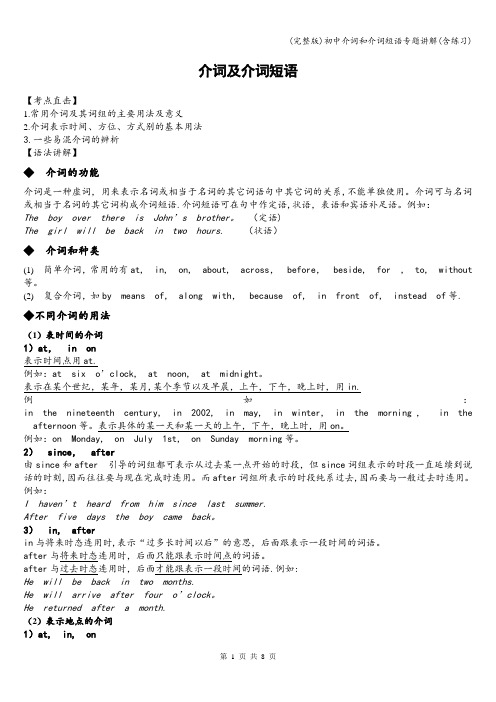
介词及介词短语【考点直击】1.常用介词及其词组的主要用法及意义2.介词表示时间、方位、方式别的基本用法3.一些易混介词的辨析【语法讲解】◆介词的功能介词是一种虚词,用来表示名词或相当于名词的其它词语句中其它词的关系,不能单独使用。
介词可与名词或相当于名词的其它词构成介词短语.介词短语可在句中作定语,状语,表语和宾语补足语。
例如:The boy over there is John’s brother。
(定语)The girl will be back in two hours. (状语)◆介词和种类(1)简单介词,常用的有at, in, on, about, across,before,beside, for , to, without 等。
(2)复合介词,如by means of, along with,because of, in front of, instead of等.◆不同介词的用法(1)表时间的介词1)at,in on表示时间点用at.例如:at six o’clock, at noon, at midnight。
表示在某个世纪,某年,某月,某个季节以及早晨,上午,下午,晚上时,用in.例如:in the nineteenth century, in 2002, in may, in winter, in the morning,in the afternoon等。
表示具体的某一天和某一天的上午,下午,晚上时,用on。
例如:on Monday, on July 1st, on Sunday morning等。
2)since,after由since和after 引导的词组都可表示从过去某一点开始的时段,但since词组表示的时段一直延续到说话的时刻,因而往往要与现在完成时连用。
而after词组所表示的时段纯系过去,因而要与一般过去时连用。
例如:I haven’t heard from him since last summer.After five days the boy came back。
初中英语语法复习之介词讲解-(共50张PPT)
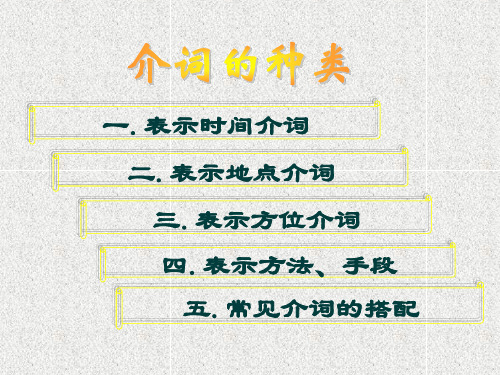
8.in a read coat, the girl in yellow, the boy in white…
3. in English , in French , in your own words, in three language… ____使_用_语__言_用__介_词__in_______
4. in a loud voice, in a low voice… ___使__用_声_音__用_介_词__i_n_____
A. on, over B.above, on C.over, on 5.The sun rose ___the horizon(地平线).
A. on B. above C.over 注意: on 接触平面
over 在平面的正上方 above 在上方
3. in + 大地方 at + 小地 方 on +门牌,某层楼
in space…
____表__示__大__地__方__用__i_n______
❖ 3. in the box, on the chair, under the desk, next to Kate, on the right of Lucy, in front of the house, behind the door…
介词:通常用在____代_词____、___名_词___、__动_名__词__
之前,表示某个人、事物/东西、事件与 另一个之间的___关__系____。
2023年初中英语语法精讲之介词和介词短语

2023年初中英语语法精讲之介词和介词短语介词和介词短语的概念:介词是一种用来表示词与词、词与句之间的关系的虚词,在句中不能单独作句子成分。
介词后面一样着名词、代词或相当于名词的其他词类,短语或从句作它的宾语。
介词和它的宾语构成介词词组,在句中作状语,表语,补语或介词宾语。
介词可以分为时间介词、地点介词、方式介词和其他介词。
误用介词的三种情形:1、多用介词:多用介词多是受汉语意思的影响将及物动词误用作不及物动词,也多是受相干结构的影响而用错:误:We discussed about the plan.正:We discussed the plan. 我们讨论了计划。
误:Did he mention about the accident?正:Did he mention the accident? 他提到那次事故了吗?误:I saw her enter into the bank.正:I saw her enter the bank. 我看见她进了银行。
误:He married with[to] a nurse.正:He married a nurse. 他同一位护士结了婚。
误:How can contact with you?正:How can contact you? 我怎么与你联系?误:We should serve for the people heart and soul.正:We should serve the people heart and soul. 我们应当全心全意地为人民服务。
误:Who controls over the factory? (但名词control可接over)正:Who controls the factory? 谁管理这个工厂?误:He has a great many of friends here. (比较a great number of)正:He has a great many friends here. 他在这儿有很多朋友。
九年级英语专题复习教案:介词和介词短语知识讲解(中考资料)
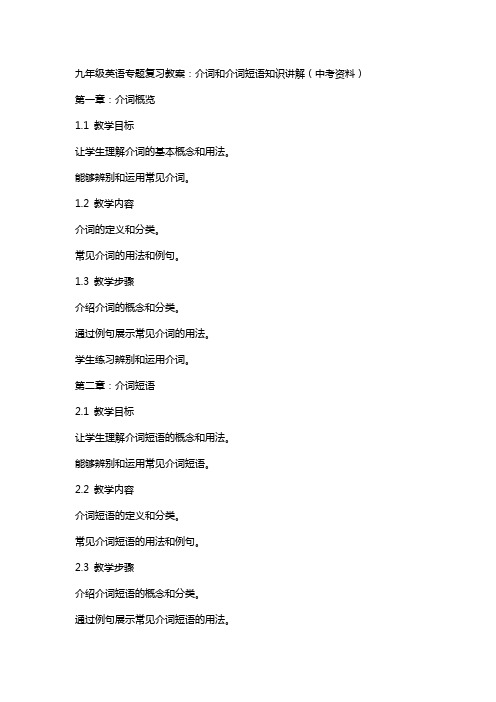
九年级英语专题复习教案:介词和介词短语知识讲解(中考资料)第一章:介词概览1.1 教学目标让学生理解介词的基本概念和用法。
能够辨别和运用常见介词。
1.2 教学内容介词的定义和分类。
常见介词的用法和例句。
1.3 教学步骤介绍介词的概念和分类。
通过例句展示常见介词的用法。
学生练习辨别和运用介词。
第二章:介词短语2.1 教学目标让学生理解介词短语的概念和用法。
能够辨别和运用常见介词短语。
2.2 教学内容介词短语的定义和分类。
常见介词短语的用法和例句。
2.3 教学步骤介绍介词短语的概念和分类。
通过例句展示常见介词短语的用法。
学生练习辨别和运用介词短语。
第三章:介词和介词短语的辨析3.1 教学目标让学生能够辨别和正确运用介词和介词短语。
3.2 教学内容介词和介词短语的辨析方法。
常见介词和介词短语的混淆点。
3.3 教学步骤介绍介词和介词短语的辨析方法。
通过例题展示常见介词和介词短语的混淆点。
学生进行辨析练习。
第四章:介词和介词短语的运用4.1 教学目标让学生能够熟练运用介词和介词短语。
4.2 教学内容介词和介词短语的运用技巧。
常见介词和介词短语的运用场景。
4.3 教学步骤介绍介词和介词短语的运用技巧。
通过例题展示常见介词和介词短语的运用场景。
学生进行运用练习。
第五章:中考介词和介词短语题型解析5.1 教学目标让学生了解中考介词和介词短语的题型。
掌握解题技巧和方法。
5.2 教学内容中考介词和介词短语的题型分析。
解题技巧和方法。
5.3 教学步骤分析中考介词和介词短语的题型。
分享解题技巧和方法。
学生进行真题练习。
第六章:介词和介词短语的综合练习6.1 教学目标让学生通过综合练习巩固介词和介词短语的知识。
提高学生的综合运用能力。
6.2 教学内容综合练习题:包括选择题、填空题、改错题等。
6.3 教学步骤给学生发放综合练习题。
学生独立完成练习题。
老师讲解答案并指出学生常见错误。
第七章:介词和介词短语的拓展知识7.1 教学目标让学生了解介词和介词短语的拓展知识。
初中英语介词和介词短语知识点精解

初中英语介词和介词短语知识点精解介词是连接词汇与词汇之间,短语与短语之间,句子与句子之间的一个重要类别。
它在句子中常常作状语、定语、宾语等成分,用来说明动作的方式、时间、地点、目的等。
介词短语由介词加上它的补语(通常是名词、代词或名词性短语)组成。
初中阶段是学习英语语言基础的重要时期,掌握好介词和介词短语的用法非常重要。
本文将重点解析初中英语中介词和介词短语的知识点。
一、介词的基本用法1. 表示时间:on, in, at- on用于特定的日期或星期几,如on Monday(在星期一)、onJuly 1st(在7月1日)。
- in用于年、季节、月份等宽泛的时间段,如in 2022(在2022年)、in summer(在夏季)。
- at用于具体的时刻,如at 9 o'clock(在九点钟)。
2. 表示地点:in, on, at- in用于大的区域或范围,如in the city(在城市里)、in China(在中国)。
- on用于具体的位置或表面,如on the table(在桌子上)、on the wall(在墙上)。
- at用于特定的位置或建筑物,如at the bus stop(在公交车站)、at school(在学校)。
3. 表示方式:by, with- by表示通过某种方式或方法,如by bus(乘坐公交车)、by email (通过电子邮件)。
- with表示使用某种工具或伴随某人做某事,如write with a pen(用钢笔写)、go shopping with friends(和朋友一起购物)。
4. 表示原因:for, because of- for表示出于某种目的或原因,如study hard for good grades(为了取得好成绩)、thanks for your help(感谢你的帮助)。
- because of用于说明某种原因,如because of the rain(因为下雨)。
- 1、下载文档前请自行甄别文档内容的完整性,平台不提供额外的编辑、内容补充、找答案等附加服务。
- 2、"仅部分预览"的文档,不可在线预览部分如存在完整性等问题,可反馈申请退款(可完整预览的文档不适用该条件!)。
- 3、如文档侵犯您的权益,请联系客服反馈,我们会尽快为您处理(人工客服工作时间:9:00-18:30)。
2024年初中英语语法学习之介词与介词短语介词是英语中最为活跃的词汇之一,掌握介词的规律对于英语学习至关重要。
根据的资料,以下是一些常见的英语介词种类:in/on/at:这些介词都表示在某个位置或时间上。
例如,“in the morning”(早上),“on the table”(桌子上),“at noon”(中午)。
for/to:这些介词都表示方向或目的。
例如,“for example”(例如),“to the nearest hospital”(去最近的医院)。
with/by:这些介词都表示伴随或方式。
例如,“with my friends”(和我的朋友们一起),“by train”(乘火车)。
at/in/on:这些介词都可以表示时间。
例如,“at night”(晚上),“in the morning”(早上),“on a sunny day”(晴天)。
for/over/through:这些介词都可以表示时间长度。
例如,“for a year”(一年),“over the weekend”(周末),“through the night”(整个夜晚)。
以上仅是一些常见的介词种类,英语介词还有很多其他种类,需要学习者在学习和实践中不断积累和掌握。
介词是英语中非常重要的语法部分,也是中考和高考的重点之一。
在考试中,正确使用介词可以帮助我们更好地表达意思,避免语法错误。
以下是一些常见的介词考点:in,on,at,over这些介词都可以用来表示时间,但用法略有不同。
例如,in可以用来表示周、月、季节、年和泛指的上午、下午、晚上(指在一段时间内)。
而on可以用来表示某天、某一天的上、下午(指具体的某一时)。
at则用于表示时刻、时间的某一点。
此外,over可以用来表示覆盖、超过、越过等意思。
on这个介词可以用来表示具体某一天的时间,例如on Monday表示在周一。
它还可以用来表示在某个具体的时间点,例如on time表示准时。
此外,on还可以用于表示“在上面”、“在…上面”等意思。
at这个介词通常用于表示小地方或小范围的位置,例如at the corner表示在拐角处。
它还可以用来表示在某个具体的时间点,例如at noon表示正午。
此外,at还可以用于表示在某个特定的地点,例如at the library表示在图书馆里。
in这个介词通常用于表示大地方或大范围的位置,例如in the city表示在城市内。
它还可以用来表示在某个具体的时间点,例如in the morning表示在早上。
此外,in还可以用于表示在某个特定的时间段内,例如in the afternoon表示在下午。
on这个介词通常用于表示具体某一天的时间,例如on Monday表示在周一。
它还可以用来表示在某个具体的时间点,例如on time表示准时。
此外,on还可以用于表示在某个特定的地点,例如on the beach 表示在沙滩上。
介词短语是由一个介词和一个或多个名词、形容词、副词等构成的短语,常常用来修饰动词、形容词或其他副词。
以下是一些常见的介词短语:in the morning(早上):表示在某个具体时间点。
on the table(桌子上):表示在某个具体位置上。
at noon(中午):表示在某个具体时间点上。
for example(例如):表示作为一个例子。
to the nearest hospital(去最近的医院):表示前往某个地方。
with my friends(和我的朋友们一起):表示和某个人或群体在一起。
by train(乘火车):表示通过某种方式前往某个地方。
over the weekend(周末):表示在某一个具体的时间段内。
through the night(整个夜晚):表示在整个时间段内。
for a year(一年):表示在一个特定的时间段内。
over the weekend(周末):表示在某一个具体的时间段内。
through the night(整个夜晚):表示在整个时间段内。
介词和介词短语一、单句填空1.Xi'an is home much immovable cultural heritage.2.There is no doubt that those extraordinary people can have an outstanding influence our country.3.As Hua Mulan worries that her father is too elderly to fight, she decides to dress as a man and gohis place.4.Cooking a meal can provide different people different experiences.5.There is a long, long story T'ai Chi and me," says Jose Gago.6.There are many elective courses for students to choose at my university, ranging from art to zoology.7.Instead of treating the wildfire a threat to be swiftly extinguished, Americans need to learn to live with it.8.He rescued two chicks that had fallen their nest in his front yard five years ago.9.White cranes are also known as "living fossil" birds, only about 4,000 in the world.10.The brand was born in Wuzhen in 1848 and has been popular the distinctive taste of its duck products.二、单句改错1.I love to see a clean and tidy classroom and I am proud with it.st year, I decided to participate a voluntary reading program on weekends.3.In a recent evening, my dad prepared food in the kitchen.4.They stared for the small screen and cheered in front of the TV.5.We are supposed to form a good eating habit, which is great benefit to our health.6.First of at all, as smart online learners, we can make full use of the educational resources to broaden our horizons.7.Not only does it affect their own study, but also it does harm for others.8.Mr. Li set a good example to me. "I must learn about him," I said to myself.9.I'm writing to apply to this position.10.After being busy for my studies in the school for a whole week, I really need some time to do something I like.参考答案一、单句填空1.to be home to是固定搭配,意为"是……的家园"。
2.on have an influence on...是固定搭配,意为"对……产生影响"。
故填on。
3.in in sb.’s place为固定短语,意为"代替,顶替"。
4.with provide...with...是固定短语,意为"为……提供……"。
语境表示"做饭能为不同的人带来不同的体验"。
故填with。
5.between between...and...意为"……和……之间",符合句意。
故填between。
6.from句意:我所在的大学有很多选修课供学生选择,从艺术到动物学都有。
结合句意可知,此处表示"从很多选修课中选择",应用介词from。
7.as treat...as...为常见搭配,意为"将……视为……"。
8.from/off结合语境可知,此处表示"两只从鸟巢掉下来的小鸟",off"从(某处)落下,离开"或from"从"符合语境。
9.with句意:白鹤也被称为"活化石"鸟类,全世界只有约4 000只。
空处涉及with的复合结构,即"with+宾语+宾语补足语",only about 4,000为宾语,in the world为宾语补足语,with的复合结构在句中作状语,故空处应用with。
10.for句意:该品牌于1848年诞生于乌镇,因其鸭产品独特的口味而广受欢迎。
空后"the distinctive taste"表示该品牌受欢迎的原因,for表示原因。
故填for。
二、单句改错1.with→of be proud of是固定搭配,意为"为……感到骄傲"。
2.participate后加in participate in为固定搭配,表示"参加,参与"。
3.In→On当特指某一天的早晨或晚上时,介词需要用on,所以需要将In 改为On。
4.for→at stare at是固定短语,意为"凝视,盯"。
5.is后加of此处为"be + of +名词"结构,相当于"be+形容词"。
